Predator in the vault: Olympians break silence on alleged abuse by top coach
Australia’s most celebrated pole vault coach was for decades lauded as ‘a genius in his field’. Behind the medals and glowing headlines, a much darker story was unfolding – and it was all in plain sight.
Australia’s most celebrated pole-vaulting coach groomed, propositioned, sexually harassed and inappropriately touched multiple young female athletes in his care, in a pattern of predatory behaviour that was ignored and then kept secret by the West Australian Institute of Sport for more than 15 years.
The Australian can reveal how Russian-born pole vaulting coach Alex Parnov was able to prey on a succession of vulnerable girls and young women, many of whom complained about him but were told he was too important to the sport’s success to be sacked.
Some of Australia’s greatest Olympic champions, including gold medal winners Nina Kennedy and Steve Hooker, have now broken their silence to expose a shocking story of betrayal and a culture of abuse hidden for more than a decade.
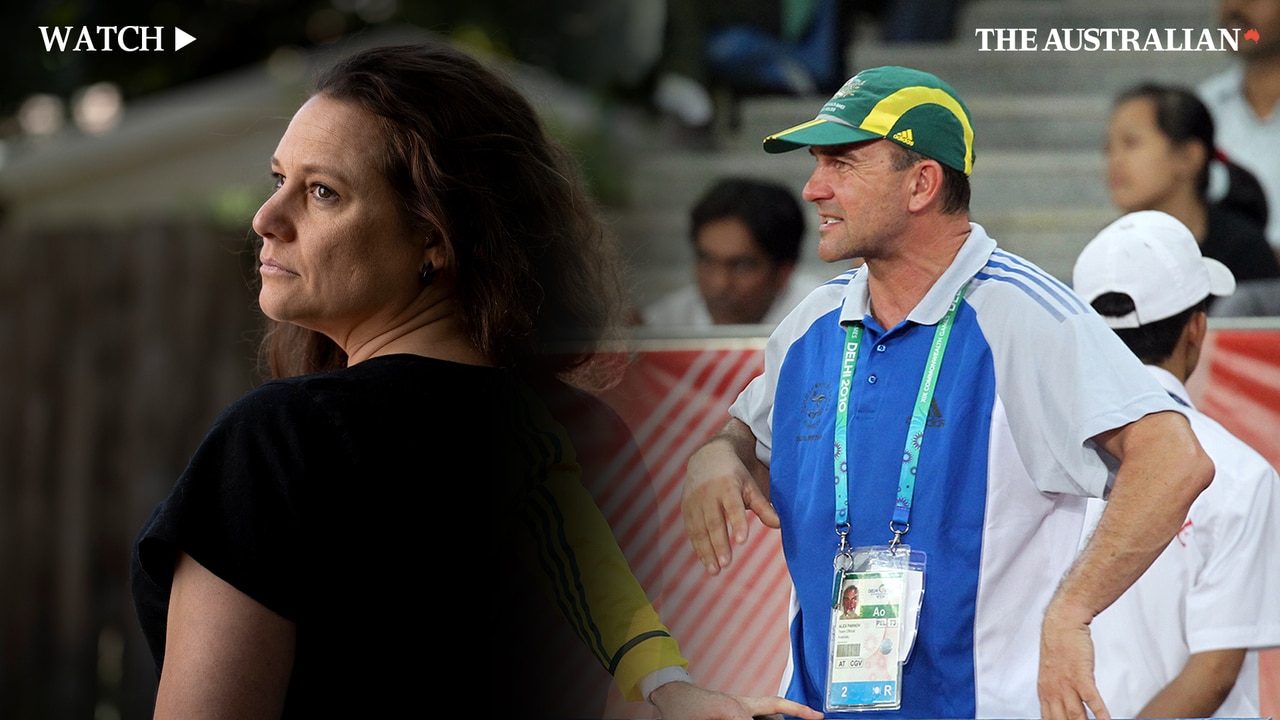
An investigation by The Australian has uncovered a trove of texts, emails and incriminating video, as well as secret reports of incidents that should have been reported to police.
The investigation raises disturbing questions about whether a failure to act by some of the most respected sporting bodies, senior officials, psychologists and others was the product of apathy and ignorance – or a calculated decision to protect a serial predator deemed too valuable to lose.
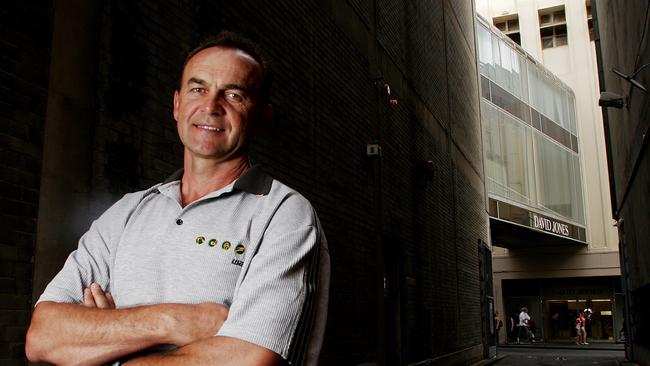
Olympians speak out
“Athletes deserve to feel safe and supported; however, I believe the organisations responsible for safeguarding us failed to protect myself and others and enabled my former coach’s harmful conduct to persist for over a decade,” Kennedy said.
“They put him on a pedestal. They allowed him to get away with anything because he was one of the best technical pole vault coaches in the world”, said Commonwealth Games gold medallist and Olympian Kym Howe.
Parnov’s modus operandi – kissing female athletes on the lips without consent, sliding his hand up their legs, booking single hotel rooms on away trips, inviting athletes to his room while wearing only a towel – became so well known that year after year his athletes would pass on warnings to those who followed them.
The 65-year-old coach is alleged to have had sex with at least one vulnerable young athlete.
The Australian has spoken to seven women who alleged they were sexually harassed and inappropriately touched by Parnov. Three claim they were groomed by the coach.
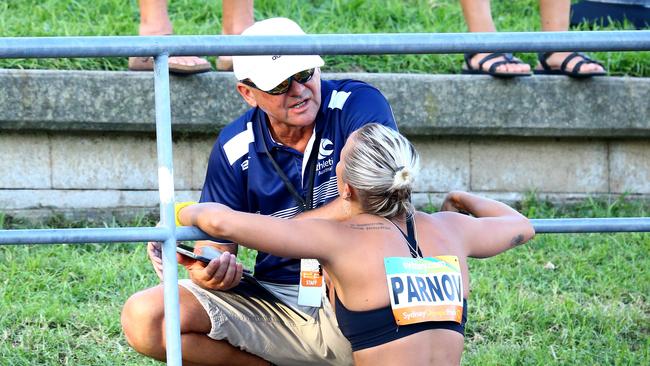
Cathy Freeman’s former coach Nic Bideau said on an overseas trip he witnessed Parnov passionately kissing a young athlete in a hotel room. “I’d just been out running and came back and they were in a room together, and the curtains were open, and I could see them … just being intimate … kissing,” said Bideau, who told an Australian athletics official.
WAIS ‘failed to act’
Despite multiple complaints dating back to 2009, the Western Australian Institute of Sport failed to take any significant action against Parnov, even when it became aware of a 2016 video showing him sliding his hand down the bottom of a then-18-year-old Nina Kennedy.
Kennedy, who endured grossly inappropriate behaviour from Parnov over a period of several years, said: “I’ve been fighting this battle behind closed doors, in my own way, while trying to reach and succeed at the pinnacle of my sport. This story has weighed on my shoulders for many years. It was only once my coach resigned that I felt like I could fulfil my potential and see what I could do in the sport; all the other individuals didn’t get that chance – which is heartbreaking.”
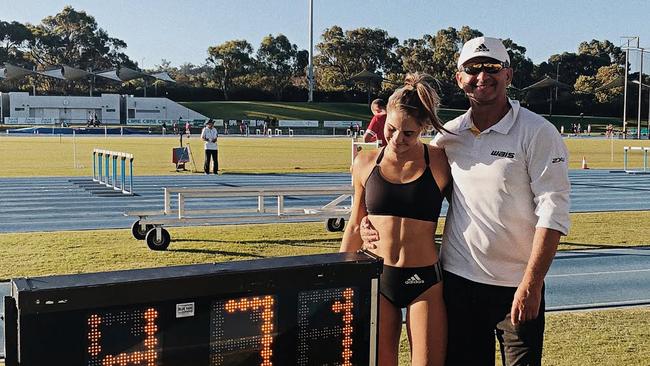
“The purpose in speaking out is to hold to account the behaviours and systemic failures of organisations that not only harmed me but allowed harm to persist for so many others.”
Parnov was also secretly taking a cut from the earnings of many of his athletes, despite already being paid by WAIS, demanding up to 15 per cent of their winnings, sponsorships and scholarships. One athlete paid Parnov more than $160,000.
When WAIS finally terminated Parnov’s contract in 2019 it declined to state the reasons, allowing him to seek employment coaching other young female athletes.
“Despite my best efforts to advise the people in positions of power at Athletics Australia and WAIS, nothing was done – and nothing has been done,” said Olympian and Commonwealth Games gold medallist Alana Quade (nee Boyd) who was propositioned by Parnov when the coach tried to entice her onto his bed to watch a movie on his laptop.
“And now it appears that things have been done to cover up the fact that they didn’t do the right thing by us as athletes.”
Suicide attempt
The abuse has had lifelong consequences for some of Australia’s most talented athletes.
Howe, who declined to share a bed with Parnov in the single room he’d booked for the pair on a competition tour, walked away from the sport just a year out from the Beijing Olympics, despite having been preselected for the team.
Up-and-coming young athlete Simone Carre, who said Parnov tried to have sex with her while she was babysitting one of his daughters, was so relentlessly harassed after she rejected him that she tried to take her own life.
Promising 18-year-old pole vaulter Emma Draisey was so distressed by Parnov’s inappropriate touching and kissing – and the bullying she experienced when she rejected his advances in 1997 – that she quit his then Adelaide-based squad.
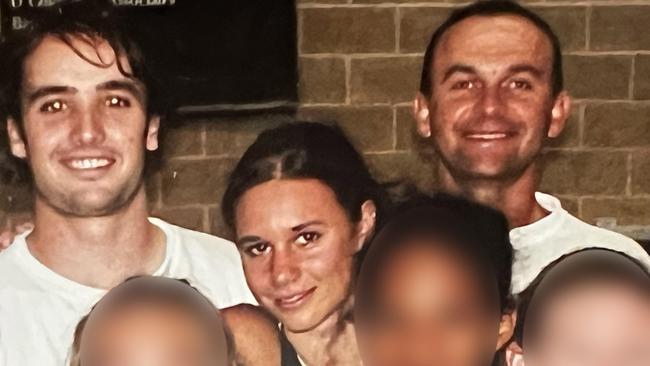
Emerging stars Erryn Boxall and Emma Philippe, who represented Australia in the World Youth Championships, both developed lifelong eating disorders.
A report last year by a WA police officer seconded to investigate the misconduct found that some of the complaints of sexual and financial misconduct by Parnov were so serious they should have been taken to the police.
Among other allegations against Parnov:
■ That he sent messages to an athlete saying “I love you”;
■ Massaged an athlete in a way that made her so uncomfortable she told him to stop and reported him to the institute;
■ Invited athletes to his hotel room while he was dressed only in a towel and to “get into his bed if they are cold”;
■ Told a female athlete he could “only coach female athletes that I am attracted to”;
■ Body-shamed and bullied athletes about their weight and body shape;
■ Booked himself and a female athlete into a single hotel room and got angry when she slept on the couch;
■ Followed an athlete into her dorm room after a night of drinking and told her “I want to tuck you in”;
■ Ordered a male athlete and his girlfriend, also an athlete, to break up their relationship, which they did.
Parnov is now believed to be living in Russia. He did not respond to questions from The Australian.
The allegations have prompted calls from WA Liberal leader Libby Mettam for a full investigation.
“Following the damning findings of the 2022 Sport Integrity Australia Review of the gymnastics program at the Western Australian Institute of Sport, the Labor government made much of its new appointments to the leadership and board of WAIS to change the culture and improve governance,” Ms Mettam said in a statement.
“We now need certainty that these latest very serious matters are being appropriately investigated and that the safety and wellbeing of all our elite athletes is properly addressed.”
Former pole vaulter Paul Burgess, who helped coach Kennedy to both world championship and Olympic gold, said he lost his livelihood in the pursuit of “seeking the truth” and trying to protect his star athlete and others.
“What I would like is for the system to change, and to me it seems no one is holding the taxpayer-funded Western Australian Institute of Sport to account – I believe there needs to be a truly independent investigation into WAIS,” Mr Burgess said.
The WAIS pole vaulting program is widely regarded as one of the best in the world and Parnov, who migrated to Australia from Russia in 1996, was central to its reputation.
Parnov arrived just as Australia was building up to the 2000 Sydney Olympic Games, hailed as a coaching guru by athletes who would go on to become household names, including his niece, Tatiana Grigorieva, whose brilliant and unexpected silver medal in pole vault would elevate the sport into the national consciousness.
Parnov is the patriarch of an athletics dynasty. His daughter Liz is a two-time Olympian who last year won Australian Survivor: Heroes and Villains, taking home $500,000 in prize money. Daughters Vicky and Alla are also champion pole vaulters.
A 2007 profile in The Australian described Parnov as “a genius in his field”, noting: “His books are full, but the best pole vaulters from overseas have been flocking like bees to his honey pot in Perth.”
But behind the glowing headlines a much darker story was playing out.
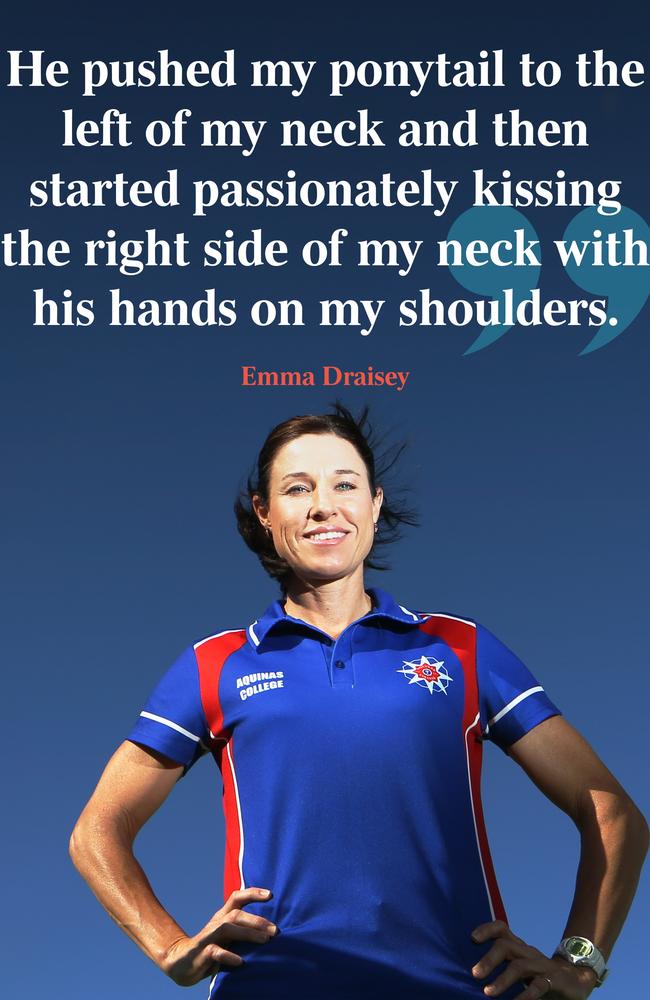
Emma Draisey
It was 1997 and 18-year-old Emma Draisey was training with Parnov’s squad in Adelaide. She had moved from Queensland with high hopes of competing internationally one day. “I didn’t realise it at the time, but in those few short months being coached by Parnov, I was being groomed,” she said.
An incident when she was home alone and Parnov turned up left her shaken. Parnov dropped her off after a Sunday afternoon gymnastics training session, only to turn up 15 minutes later back on her doorstep.
“I assumed he was returning to visit the family I was staying with in Adelaide, which he also knew as he was also coaching their 16-year-old daughter.”
Draisey told Parnov the family wasn’t home but he was welcome to join her watching a replay of an Adelaide Grand Prix athletics meet while he waited.
Draisey returned to sit in the middle of the floor as she had been, while Parnov took a place on the chair “right behind” her. While they were watching, he leant forward and started to play with her long ponytail. “And then he pulled my ponytail out. I said: ‘What are you doing?’,” Draisey said.
“He lent forward again, pushed my ponytail to the left of my neck and then started passionately kissing the right side of my neck with his hands on my shoulders.
“Oh, my God. I froze. I then put my right hand up and pushed him away from my neck, and I said, stop, ‘don’t touch me’. And he stopped. And I sat there on the floor frozen in silence for a few minutes, not knowing what to do. And then he tried it again.
“And this is when I got up. I burst into tears, and I ran to the room I was staying in, and he followed me. There was no lock on the door. He began talking to me and proceeded to try and cover his tracks and protect himself.”
Draisey said: “He told me not to tell anyone.” He finally left.
Draisey confided in another squad mate, future silver Olympic medallist Grigorieva, who allegedly replied “stupid, stupid man”.
In the weeks after the incident, she said, “Alex ignored and distanced himself from me”.
Draisey then told Alan Launder, the coach who originally invited her to train in Adelaide. Launder confronted Parnov who denied everything that happened and made Draisey out to be “unstable and a liar”.
Meanwhile, whenever Parnov would address the squad at training, he would deliberately ignore her. The silence she faced became unbearable. She quit shortly after that and began training under Launder.
When Kym Howe joined Parnov’s squad, Draisey “warned her” of his behaviour and told her that she “should be careful”.
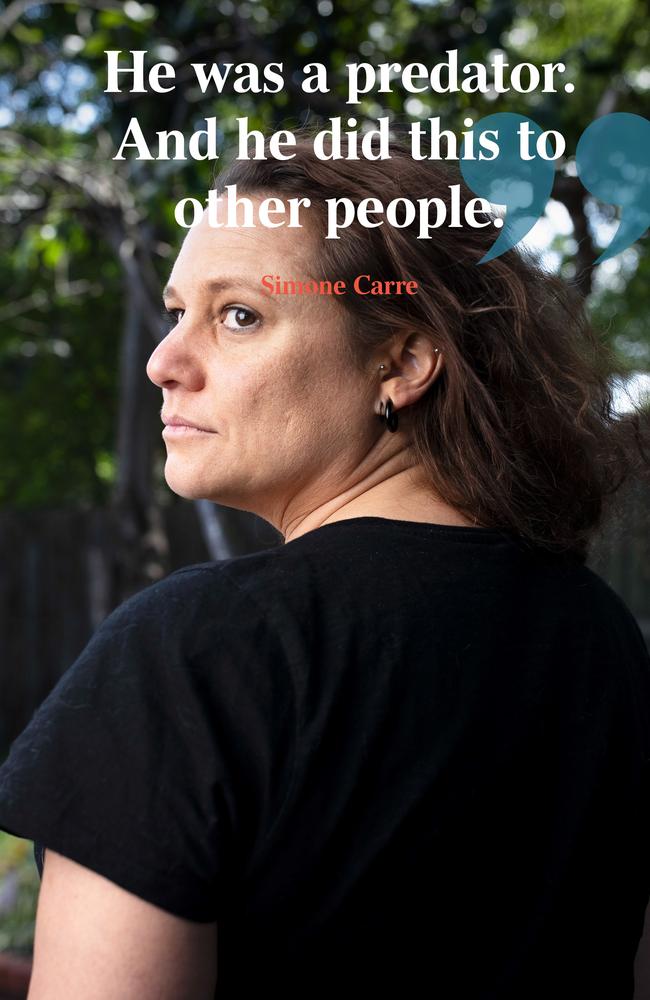
Simone Carre
Simone Carre was 19 when she was approached by Parnov at a national athletics event in 2000.
“He watched me long jump, and he thought that I would be good at pole vault,” said Carre.
“It was exciting. Alex was a very high-profile coach with some high-profile athletes – it was kind of flattering to have someone notice you.”
The coach said he wouldn’t charge Carre any fees but she could help him with his English and babysit his young children.
Parnov soon began touching her in ways that made her feel uncomfortable: “Stroking my hair or stroking my back all the way down to kind of my bum, but just not very obvious stuff. ”One day when Carre was doing badly at her jumps and began crying, Parnov, who had been sitting in a shed by the track, came over to her. “He was like, ‘you don’t want people to see you cry’. And he pulled me onto his lap in the shed, and then he closed the door, and I just felt so uncomfortable. I had no control, he just grabbed me; I was frightened, terrified, frozen.”
On another occasion, when Parnov’s wife, Nadia, had gone to visit family in Russia, the coach asked her to babysit and came home drunk, she said. Carre was in the spare room with one of Parnov’s younger daughters asleep on the other side of the bed.
“I guess he was surprised when he came in that she was there. He tried to wake her up to get her to go to her own room, and she’s like, No, Dad, I want to stay here. I was awake, but I’d pretended to be asleep. And he just kept trying to wake me up. He was stroking my hair, touching my hand, my arm and whispering in my ear and I was just frozen.
“I couldn’t believe he was doing this to me with his daughter lying right next to me, that he was trying to get me to come to his bed, to his room, to have sex with him.”
After that incident, Parnov’s attitude towards her changed, Carre said. “He was becoming very hot and cold. It went from sexual stuff to fat shaming.
“It was when I weighed 57 kilos, which was hardly anything, that Alex thought I was too fat and I was not allowed to pole vault for a week, and I think he did this sometimes with athletes, and I was being punished.”
Carre was put on an extreme dieting and exercise regime but became ill and ended up in hospital. “I had gotten pneumonia because I’d been so run down,” she said.
Carre returned to training, still hopeful of competing at the Athens Olympics, but she was not in a good mental state. Pole vaulting is a dangerous sport, with athletes required to propel themselves several metres into the air, and Carre was “running through” – baulking at the jump. Worse, false rumours had spread that she was pregnant to Parnov.
“I was horrified that this is what people thought about me; it wasn’t like (they were thinking) Alex is a sexual predator”, she said.
Carre said she went to see the WAIS sports psychologist in his office and told him about Parnov’s inappropriate behaviour.
“I went through it with him, and I was like, maybe this is the reason why I keep running through, is because it’s scary to go to training now. You don’t know what mood he was going to be in.”
Carre was gobsmacked by the psychologist’s response.
“He was like, you could come and tell people and then you would be ruining – essentially, that’s what he said, ruining – the careers of these of my training partners, who were Olympians, who had won medals at Commonwealth Games. That I’d be ruining their careers because he’s one of the best, or the best, pole vault coach in the world. That it’s a privilege to me to train with him, and you know that I’d be ruining their careers if I came out.
“I felt like he didn’t believe me of what was happening. It kind of ruined me. That it was my fault, or that I’m not worth it. Like, if he is inappropriate to you, then who cares? Who are you? You’re not a world champion. You’re not a world record holder.”
Carre said she felt alone and isolated. “I didn’t feel believed, didn’t feel supported. I tried to kill myself, and I ended up in a psych hospital. So that was twice in one year that I ended up in hospital because of Alex’s behaviour. I was in a psych ward for a month.”
Carre said she would love to have gone back to pole vaulting, but in Perth there were no options for the sport at that level besides with the WAIS.
Now 42 and living in Melbourne, Carre is a respected athletics coach herself. She is revealing what happened to her in the hope that it will empower other young women to feel confident about also speaking up.
“He was a predator. And he did this to other people. There were so many up-and-coming female vaulters at the time, good vaulters who had set records, and where are they now? They didn’t achieve their goals. They were really talented athletes, and they just disappeared, like I disappeared.”
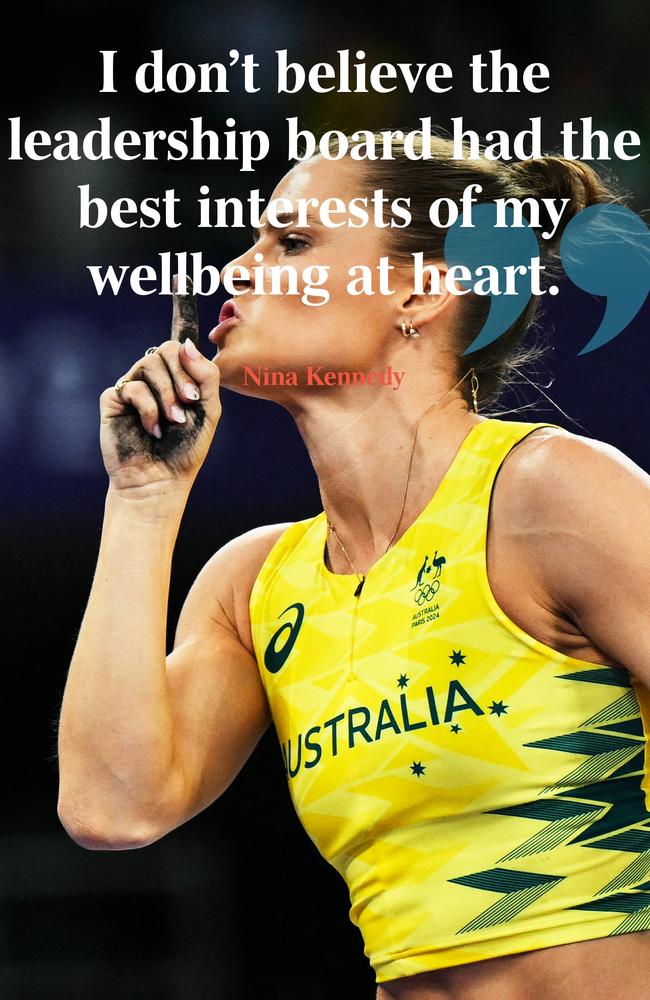
Nina Kennedy
Nina Kennedy’s gold medal at the Paris Games – making her Australia’s first female pole vault Olympic champion – set her place in the nation’s sporting history. It was also a mark of her extraordinary determination in overcoming a series of mental and physical challenges that would have defeated a lesser athlete.
“It was like, ‘Damn girl, you are good enough to win an outright gold medal’,” she said after the win.
“It’s vulnerable to put yourself out there and to say that. But now I am, I really, truly believe that.”
More remarkable still was that for years Kennedy had been privately fighting another battle: first to stop the inappropriate behaviour of Parnov, and then to have the WAIS take action against him.
WAIS was well aware of the 2016 video from a world junior camp circulating among the close-knit pole vault fraternity that showed Parnov sliding his down Kennedy’s back and across her bottom as they watched a practice session from the sidelines.
But officials decided “not to go through formal channels”. Instead Parnov would be given “a strong warning”. Little wonder Kennedy feels WAIS failed to properly deal with her multiple complaints about her coach. The Australian is aware of the details of Parnov’s abuse but has respected Kennedy’s request for privacy as she deals with the aftermath of investigations that she believes failed to “bring to light the seriousness of the alleged misconduct”.
“I also don’t believe the repercussions post-investigation delivered by WAIS accurately matched the severity of the allegations and findings. In this instance, I don’t believe the leadership board had the best interests of my wellbeing at heart. I felt this was prevalent during and preceding the investigative process.”
Erryn Colling (nee Boxall)
Like Carre and other athletes who were told they were “fat”, former Australian vaulter Erryn Colling was left with lifelong “scars” from her experiences with Alex Parnov.
As a 15-year-old, Colling was identified by Parnov at a local coaching clinic in Perth shortly before the Sydney Olympics. As a teen, she had great hopes of vaulting at the Commonwealth Games and the Olympics and Parnov said she had the physicality for such a demanding sport.
While she made the Australian junior team in 2002, Colling’s time on Parnov’s watch led to her suffering an eating disorder, which she still battles to this day.
The 40-year-old broke down as she recalled how Parnov relentlessly told her she was fat. At 168cm Parnov told her she needed to weigh just 50kg. It led to her “starving” herself by throwing her lunch out every day at school, as she aimed to lose 10kg as Parnov demanded.
“The body shaming led to me having an eating disorder, the constant; ‘you’re too fat, you need to lose weight, your skin folds are never okay, you need to lose another 7kg if you want to make the next team’,” Colling said through tears.
“lf I was eating something he was like why do you need to eat that? I was so sick all the time that I couldn’t even train properly.
“I still struggle with an eating disorder now, and I know that it has stemmed back to that. Every day I struggle with it and it impacts my family life, it impacts my work life. Everything that involves food comes back to that time period of my life.”
Now Colling wonders about Parnov’s constant touching.
“He was always wanting to hug before and after practice and if you’re reviewing footage, like he has to be sitting right next to you, and often the arm would go around you,” she said.
“I feel like, at the time, you don’t know, right? Because I was so young, and I just thought he cared about me? Like, because he had my best interest in mind – really he didn’t,” she said.
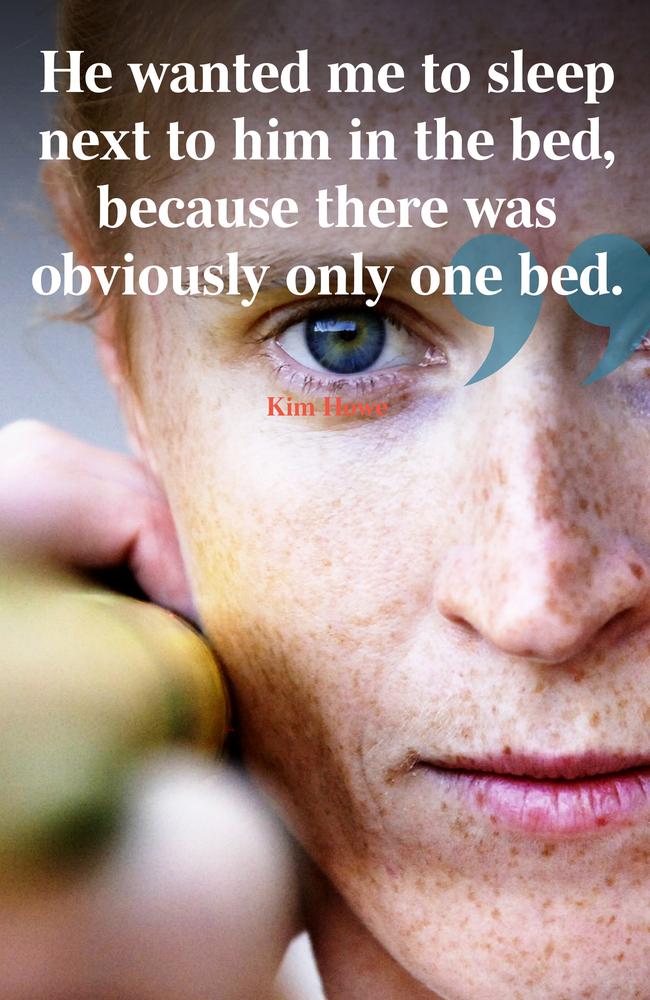
Kym Howe
Kym Howe, who prematurely quit the sport despite being destined to compete at the Beijing Olympics, her second Games, was subjected to bullying about her weight and inappropriate touching while being coached by Parnov.
Howe said, and several eyewitnesses confirmed, that Parnov would make her wrap her thighs in ‘cling wrap’ and she would jog in hot sun with her legs swathed in plastic wrap to “lose weight”. She said Parnov often told her she had a “fat bum”.
Like Alana Boyd, Howe would be subjected to inappropriate touching on the long car trips when driving in Europe to competitions and training camps.
“He would say; ‘put your feet up on the dash’. And then he would tell me how beautiful my legs are, and he would touch my legs … he would rub his hand up and down my legs. And I would have to push his hand away and just say; ‘Stop. I don’t like it when you do that’.
“I would make sure I was on the opposite side of the car, because I wouldn’t want him to touch me.”
Like other athletes, when on tour, she would often be instructed to go to Parnov’s hotel room to review videos of her training sessions. “He’d be sitting on his bed, and he would be in a towel,” Howe said. “As an adult now I look back and think, why did I not just say get dressed?
“But he’s the one with the power. You just have to do as you’re told. And multiple times I would walk out of his hotel room, and the boys would see me, and they couldn’t do anything.”
On another occasion, as happened to Boyd, Howe found Parnov had booked her into a single hotel room with him.
“When we rocked up in Switzerland, we just had one room booked … there was only one bed in this room, and there was a couch,” Howe said.
“He wanted me to sleep next to him in the bed, because there was obviously only one bed. I just refused, so I slept on the couch because I did not feel comfortable sleeping in the same bed as my coach.”
Howe, like several other athletes spoken to by The Australian, also rejected his attempts to kiss her.
“I was being touched all the time and told to not wear baggy clothes at training,” she said.
Howe said Parnov constantly made her feel as though she was on the cusp of losing her WAIS scholarship.
“You wouldn’t have your scholarship if it wasn’t for me,” Howe said Parnov often told her.
“He had the power. He made comments that made you not want to say no in other situations that make you feel uncomfortable, because you’ve got this dream to go to the Olympics.
“And there was one coach in Perth. What were we to do if he turned around and said; ‘you’re not good enough, I’m gonna make sure you lose your scholarship’. It was like you didn’t have a choice, you just had to put up with it.”
Howe warned Alana Boyd (now Quade) about Parnov just prior to her joining the squad in 2009.
Howe is speaking out in a hope to help stop the cycle of abuse.
“I think for me, the biggest thing is knowing that the situation has continued, and that no matter how many warnings multiple of us have put forward, it’s still continuing, and I have four young children who all love sport, and I never want them to have to go through what I went through.”
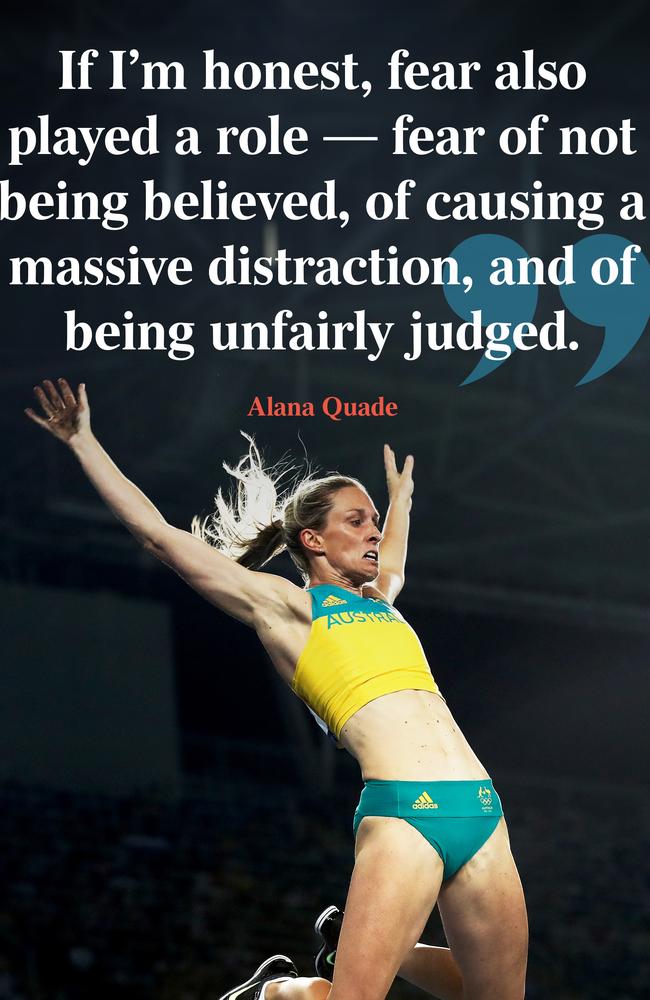
Alana Quade
For more than a decade, behind the scenes, Alana Quade has quietly tried to protect other athletes from being subjected to the inappropriate conduct by her former coach. Quade, who was contacted by The Australian, said she had never wanted to speak to the media on this issue, but now feels it is the only way to better protect current and future athletes.
“I’ve never been silent about what happened to me, but I tried to do the right thing by the sport,” Quade said.
“I avoided going to the media because I didn’t want to bring the sport into disrepute. If I’m honest, fear also played a role – fear of not being believed, of causing a massive distraction, and of being unfairly judged.
“So instead, I distanced myself from Alex as much as I could and did my best to warn other athletes about his behaviour.
“But here I am, nearly 12 years since leaving WAIS and reporting Alex’s behaviour to them and AA, over eight years retired from the sport – and yet, it still finds me.”
Quade joined Parnov’s Perth-based squad in 2009, and by 2010 she had become a Commonwealth Games gold medallist, but while it was a time of success for the athlete, she was disturbed by his inappropriate advances and touching.
She quit his Perth squad, but not the sport, in 2013.
Like several other athletes, she described Parnov rubbing her legs on long car trips.
“He said: ‘you’ve got beautiful legs, Alana’. That made me feel just really uncomfortable; it was really uncalled for, and just not OK,” Quade said.
She was also a target of Parnov’s single-hotel-room ploy.
Before a training camp in Eisenberg, Germany, Parnov said he would sort out the accommodation. But Quade arrived to find a single room booked.
“I assumed he would sort it – stupidly,” Quade said. “Instead. I’m stuck sleeping in this room with Alex, which had very close German beds, where it’s like pretty much one bed, you can’t move them apart, and I literally did not sleep one wink the whole night. I was petrified.”
Quade started insisting on making her own accommodation arrangements. On one occasion she was propositioned by Parnov when he invited her to dinner at his apartment and then tried to entice her onto his bed to watch a movie on his laptop. She said “no” and quickly left the apartment.
Upon leaving the squad, Quade reached out to the members of teen athletes’ teams, including Nina Kennedy’s. “I felt a moral obligation and responsibility to Nina and other underage female athletes in the squad upon leaving Perth to somehow warn them,” Quade said.
“I think, becoming a mother and having two girls, I don’t ever want them to experience this.
“I want there to be proper processes in place to weed out these people and hold them accountable for their behaviour and make sure that it doesn’t happen again.”
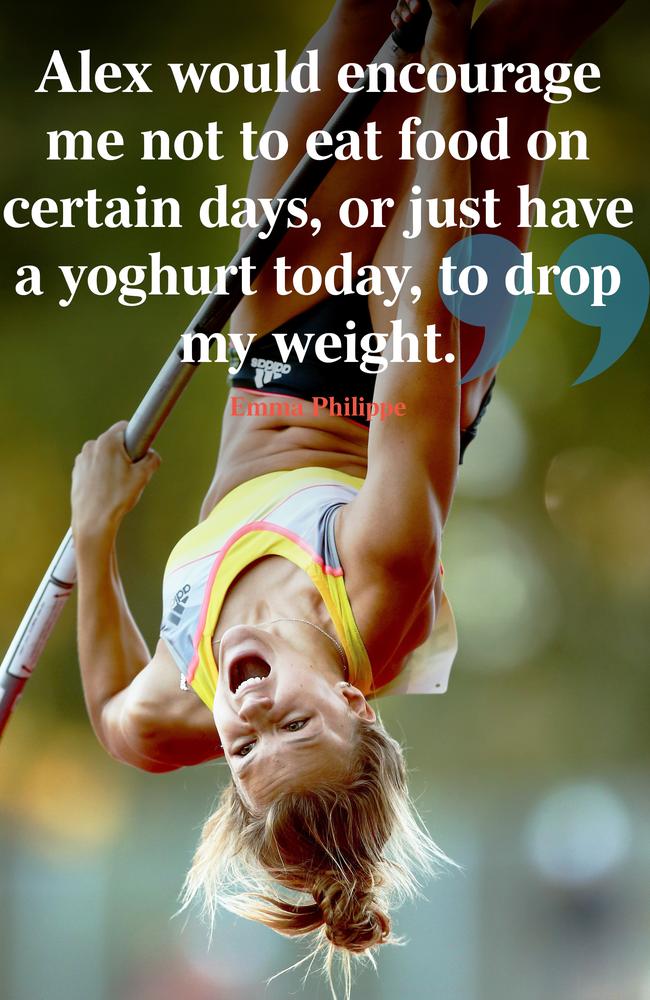
Emma Philippe
Emma Philippe began training in pole vault at WAIS in 2008 but quit the sport in 2017 after Alex Parnov’s demands left her with a serious eating disorder.
Philippe said she wasn’t subjected to inappropriate behaviour from Parnov, but his training methods were so damaging to her physical and mental health that she had to walk away from the sport.
“Alex would encourage me not to eat food on certain days, or just have a yoghurt today, to drop my weight.
“When your coach tells you you’re fat it does get in your head and make you feel awful about yourself, and it’s a slippery slope from there. The psychological impact was quite detrimental and probably ruined my career.
“He had a ballpark figure in mind that you had to weigh under 60kg and have skin folds under 60,” Philippe says. “I’ve got a master’s degree in exercise science, so I know there was no evidence behind those numbers; that was just what he thought.
“There was a period of time there that I wasn’t allowed to pole vault for three or four months because I couldn’t get those numbers down. I run about 65km a week now, and I still don’t weigh under 60. It shows you how ridiculous those numbers were. And especially, at that time, I was 17 or 18, going through all those sort of transitional phases, anyway. So it was really damaging.
“The dietitian at WAIS at the time wasn’t on board with it either but the way the pole vault program was run, what ever way Alex wanted it to go, it tended to go that way.
Now 27, Philippe is back in athletics, focused on 800m running and coaching in her spare time, but she still wonders what might have been.
“Nina and I were the up-and-coming junior athletes. I walked away from pole vault because I lost my passion for it because I got treated like I was an overweight athlete, like I was too heavy to pole vault, and looking back now that definitely wasn’t the case.
“There’s nothing to say I couldn’t have seen myself going to an Olympics and I definitely would have loved to be by Nina’s side at the Olympics.”
Do you know more? rices@theaustralian.com.au or jessica.halloran@news.com.au
For help or information call Lifeline 131 114
On Monday: How one man blew the whistle on the culture of secrecy
